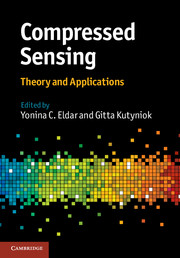Book contents
- Frontmatter
- Contents
- List of contributors
- Preface
- 1 Introduction to compressed sensing
- 2 Second-generation sparse modeling: structured and collaborative signal analysis
- 3 Xampling: compressed sensing of analog signals
- 4 Sampling at the rate of innovation: theory and applications
- 5 Introduction to the non-asymptotic analysis of random matrices
- 6 Adaptive sensing for sparse recovery
- 7 Fundamental thresholds in compressed sensing: a high-dimensional geometry approach
- 8 Greedy algorithms for compressed sensing
- 9 Graphical models concepts in compressed sensing
- 10 Finding needles in compressed haystacks
- 11 Data separation by sparse representations
- 12 Face recognition by sparse representation
- Index
12 - Face recognition by sparse representation
Published online by Cambridge University Press: 05 November 2012
- Frontmatter
- Contents
- List of contributors
- Preface
- 1 Introduction to compressed sensing
- 2 Second-generation sparse modeling: structured and collaborative signal analysis
- 3 Xampling: compressed sensing of analog signals
- 4 Sampling at the rate of innovation: theory and applications
- 5 Introduction to the non-asymptotic analysis of random matrices
- 6 Adaptive sensing for sparse recovery
- 7 Fundamental thresholds in compressed sensing: a high-dimensional geometry approach
- 8 Greedy algorithms for compressed sensing
- 9 Graphical models concepts in compressed sensing
- 10 Finding needles in compressed haystacks
- 11 Data separation by sparse representations
- 12 Face recognition by sparse representation
- Index
Summary
In this chapter, we present a comprehensive framework for tackling the classical problem of face recognition, based on theory and algorithms from sparse representation. Despite intense interest in the past several decades, traditional pattern recognition theory still stops short of providing a satisfactory solution capable of recognizing human faces in the presence of real-world nuisances such as occlusion and variabilities in pose and illumination. Our new approach, called sparse representation-based classification (SRC), is motivated by a very natural notion of sparsity, namely, one should always try to explain a query image using a small number of training images from a single subject category. This sparse representation is sought via ℓ1 minimization. We show how this core idea can be generalized and extended to account for various physical variabilities encountered in face recognition. The end result of our investigation is a full-fledged practical system aimed at security and access control applications. The system is capable of accurately recognizing subjects out of a database of several hundred subjects with state-of-the-art accuracy.
Introduction
Automatic face recognition is a classical problem in the computer vision community. The community's sustained interest in this problem is mainly due to two reasons. First, in face recognition, we encounter many of the common variabilities that plague vision systems in general: illumination, occlusion, pose, and misalignment. Inspired by the good performance of humans in recognizing familiar faces [38], we have reason to believe that effective automatic face recognition is possible, and that the quest to achieve this will tell us something about visual recognition in general.
- Type
- Chapter
- Information
- Compressed SensingTheory and Applications, pp. 515 - 539Publisher: Cambridge University PressPrint publication year: 2012
- 1
- Cited by



